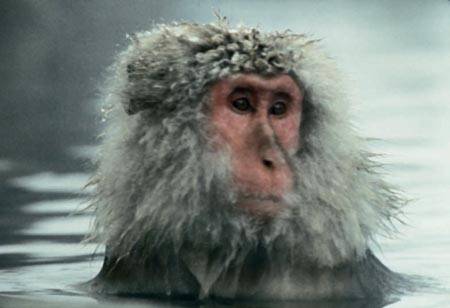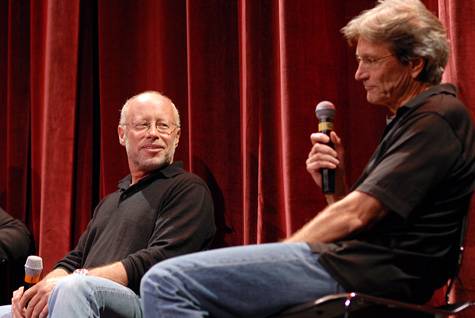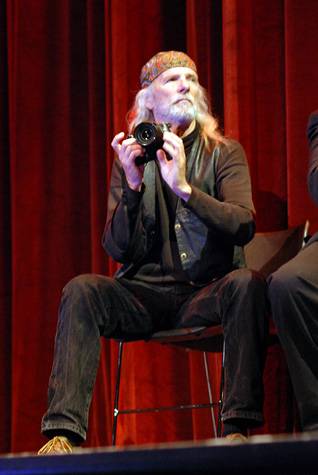 10:50am: The infamous Seat Saga continues. I arrive at the Virginia and approach my husband, who has a “strategy” planned. I can’t believe how a lovely little festival about movies has turned into a bloodlust for the coveted Perfect Seat. Yesterday’s mission turned into a fiasco when an ambush of elderly people stampeded through the East Lobby door to target our exact seating area, and we ended up sitting five rows closer to the screen than usual. I didn’t think the change was so bad (Matt Dillon was ten feet away from me, how can I complain?) but my husband vows never to be out-seated again. All I want is breakfast. He plans to go into the door of the East Lobby while I go through the main entrance.
10:50am: The infamous Seat Saga continues. I arrive at the Virginia and approach my husband, who has a “strategy” planned. I can’t believe how a lovely little festival about movies has turned into a bloodlust for the coveted Perfect Seat. Yesterday’s mission turned into a fiasco when an ambush of elderly people stampeded through the East Lobby door to target our exact seating area, and we ended up sitting five rows closer to the screen than usual. I didn’t think the change was so bad (Matt Dillon was ten feet away from me, how can I complain?) but my husband vows never to be out-seated again. All I want is breakfast. He plans to go into the door of the East Lobby while I go through the main entrance.
11:06am: The shameless cut just behind me, where a gap has opened up from my husband stubbornly sticking next to the East Lobby doors. I wait for an uprising to occur. The doors open, and some volunteer has the gall to ask the lady in front of me if she can check her bag. God dammit, woman! Don’t you know we’re in a war?!
11:07am: My husband has secured the farthest seats from the screen we’ve had this year. Apparently, he lost his cool in the final seconds and grabbed the first aisle seats he came upon in our row. At least we’re not sitting in the red zone, directly below the ledge of the balcony where Dan and I witnessed an assassination attempt with a falling water bottle.
11:35am: I fear for my life when a lady almost sits on me on her way to her seat.
12:00pm: Chaz comes on stage to prelude the last film screening for Ebertfest, Baraka. She announces the first film secured for next year’s festival is Dziga Vertov’s masterpiece, Man with a Movie Camera. Naturally, the Alloy Orchestra has been booked to play their original score for the film.
 12:05pm: Two observations: one, child actress Catinca Untaru from The Fall is just getting seated in the V.I.P. section with her beautiful family; two, the creators behind Baraka, Ron Fricke and Mark Magidson, are Twinkies in their matching blue jeans and black T-shirts. One of the Twinkies says there hasn’t been a print made from the negative of their film in ten years, and one was made specifically for Ebertfest, and after restoration, it’s “the best that’s been made.”
12:05pm: Two observations: one, child actress Catinca Untaru from The Fall is just getting seated in the V.I.P. section with her beautiful family; two, the creators behind Baraka, Ron Fricke and Mark Magidson, are Twinkies in their matching blue jeans and black T-shirts. One of the Twinkies says there hasn’t been a print made from the negative of their film in ten years, and one was made specifically for Ebertfest, and after restoration, it’s “the best that’s been made.”
Roger Ebert tells everyone to go see Gomorrah playing at “the beloved Art Theatre,” then pokes us further by saying “there happens to be a showing at 3:00pm,” which is timed perfectly following Baraka. I know that somewhere, Greg Boardman is smiling, because he specifically timed Gomorrah to play during Ebertfest knowing that Ebert loved the film. I wish Ebert would buy the historic building that houses the Art once Boardman vacates it.
12:10ish pm: Baraka screens, and the picture takes up every square inch of the Virginia’s immense screen. This isn’t a narrative film. There’s no dialogue, per se, only scenes and images from all around the world, on almost every continent; the film begins with a close-up of snow monkeys taking in a natural hot spring, and becomes a meditation of symmetry in the balance of the world. We see everything from a Kachek “monkey chant” to baby chicks being dropped down an assembly line.
1:45ish pm: Along with the director and producer of Baraka, Chaz calls out Michael Wadleigh, the director of Wednesday night’s feature, Woodstock for the panel discussion. The moderator is wearing a funny hat and does a pretty decent job until the audience literally cries out, “Wadleigh!” because the tangent hasn’t included the hippy in on the conversation. Yes, it appears Wadleigh either hasn’t changed his clothes for the entire festival, or likes to wear the same thing every day. Whatever, man, I still think he’s cool.
 The panel discussion is long and drawn out, lasting for nearly an hour. We learn “baraka” means “an in-dwelling spiritual force.” It’s clear after Wadleigh asks his first thought-provoking question to the creators of Baraka that he is unhappy with the fact they will not state a stance about their responsibility in preserving these world sights on film. A tinkling of metaphorical angel wings sound in the background as they reply to him, “The message of Baraka is that there’s a good snow monkey in all of us.” Wadleigh leans back in his chair in defeat, but is too nice to tell them what I’m thinking: that’s utter bullshit.
The panel discussion is long and drawn out, lasting for nearly an hour. We learn “baraka” means “an in-dwelling spiritual force.” It’s clear after Wadleigh asks his first thought-provoking question to the creators of Baraka that he is unhappy with the fact they will not state a stance about their responsibility in preserving these world sights on film. A tinkling of metaphorical angel wings sound in the background as they reply to him, “The message of Baraka is that there’s a good snow monkey in all of us.” Wadleigh leans back in his chair in defeat, but is too nice to tell them what I’m thinking: that’s utter bullshit.
I don’t understand how two people who have traveled all over the Earth appear to be so distant with what’s actually going on in the world. It’s clear they wanted to show the world, but not form a real message pertaining to it. At least, that’s what these guys are saying by not saying it. When Wadleigh asks them to talk about their responsibility toward filming what could be the last glimpses of many native cultures, Fricke and Magidson are happy for an audience question to let the topic drop.
Reflections on the 2009 festival
Before Saturday was quite finished, I thought my favorite film of the festival would be Guy Madden’s My Winnipeg, that gloriously strange, experimental non-documentary about his childhood and the things that may or may not have happened in that coldest city in the Americas; but then I saw the nearly-midnight feature, Let the Right One In, and I had a Pan’s Labyrinth moment (In the dictionary of Jamie, that means sitting in the theater with your mouth dropped open when the credits begin to roll, thinking you’ve just watched something brilliant). Now, I’m not going so far as to say it was that exact bullet to the brain of genius, but this Swedish vampire film is a thing of rare beauty. It’s a subtle, touching story about two children who grow to fiercely love each other, only the girl just happens to be a vampire; there’s very little CGI, an unheard of thing in American vampire cinema, and the story is a tight ring of perfection. It’s truly an original vampire idea, something I didn’t think I’d ever see in my lifetime. The film is based on the book by John Ajvide Lindqvist, focusing on a nugget of the more detailed novel, so that the movie is honed into a gem of cinema. The subtitles fiasco has been fixed for the new DVD version coming out soon, so make certain you either hold out for it or the Swedish DVD so the magic is preserved.
Another thing I’m happily taking from this year’s festival is the appreciation of seeing The Fall for a second time. I let the sourness of the first screening dim the beauty of the picture (one of those high expectations dampening the experience sort of thing), and I think I can allow myself to love the movie despite its imperfections. I also forgot how entrancing the score was, and now will remember to seek out the soundtrack.
Overall, this was a pretty decent line-up of films. Even though I’d seen four of them previously, second viewings proved to be rewarding for the most part (I skipped Trouble the Water). I still thought the motivation of Kate Beckinsale’s character in Nothing But the Truth was less than noble, but tried to think of the whole of the film differently this time around: this is one flawed character’s perspective, and we’re just watching her story. It doesn’t have to agree with my perspective.
And my suspicions about myself were confirmed on Wednesday night: I should’ve been born in the 40s or 50s so I could experience the 60s. I feel cheated.








